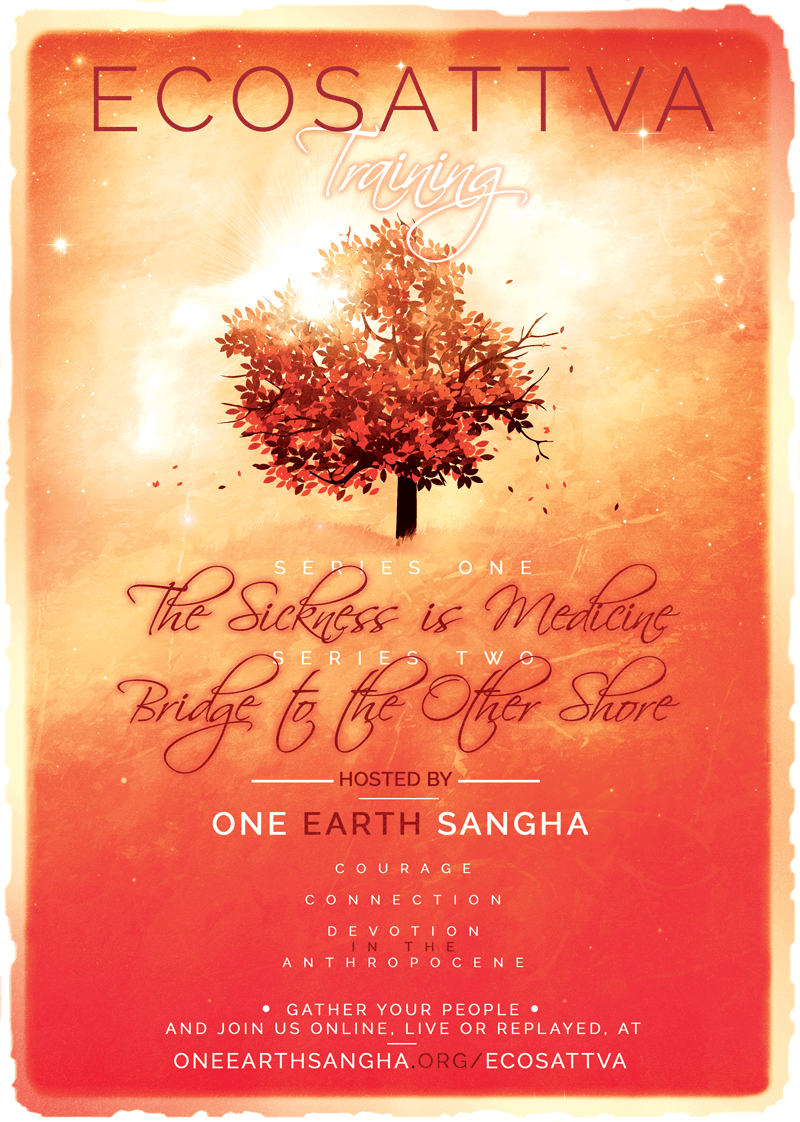Welcome to the EcoSattva Training:
Bridge to the Other Shore

[members_not_logged_in]Registered participants for the latest EcoSattva Training will find materials here. If you have not yet registered, you can do so here.
If you are registered, log in here:
[members_login_form /][/members_not_logged_in]
[members_access role=”est17_subscriber”]
Course Resources
Updates on the Course
- You’re all set to go with the series. Access Session One resources here!
- Check out our Frequently Asked Questions and if you can’t find what you’re looking for there, send an email to .
Session Format
Sessions follow the same format and consist of the following five components:
- Background material (or “homework”) to help you get the most out of the session event
- The heart of each session offering is the video featuring our guest teachers. We recommend that you schedule at 2 to 3 hours (if you want to include breaks), for a session (see ideas for time and structure below). The session generally includes
- Opening, short gathering of attention, presentations from the featured leader,
- One or more inquiry questions for you to explore individually or in break out dyads or triads within your group. Note that because of platform limitations, the opening and closing sessions will not include online breakout groups. (We are sad about this too!)
- “Harvest” (or question and answer) period where members of the community converse with the presenters,
- On some sessions, a science and policy update from Lou Leonard
- Closing including what’s next and the invitation to offer generosity.
- Practices: to deepen your exploration and building on the inquiries offered during the webinar, each session will offer a question for you to take into your meditation practice (as a contemplation) or into 2 or 3-person small groups or even larger group interactions. You are invited to share your reflections on the session page in the community discussion (see last item).
- Follow up materials provided by the course organizers and featured speakers should you want to go deeper with what was presented.
- At the base of each session resource page, we’ll host a community discussion where you can share your questions or reflections with other participants in the course.
Session Resources
Session Leaders: Lama Willa Miller, Lou Leonard
» Access Session Resources
Session Leaders: Mark Coleman, Kritee Kanko
» Access Session Resources
How is that the human race might bring about such widespread ecological destruction that its own survival is in question? While we might fairly critique dominant frameworks for knowing and valuing what is known, we can investigate how those appear in our own hearts and minds. What new possibilities emerge when we open up to other ways of knowing?
Session Leaders: Ven. Bhikkhu Bodhi, Bonnie Duran and special guest, Ron His Horse is Thunder
» Access Session Resources
Session Leader: Reverend angel Kyodo williams and Lou Leonard
» Access Session Resources.
Session Leaders: Adam Lobel and Lindsay Alterton
» Access Session Resources.
Session Leaders: Sebene Selassie and Colin Beavan
» Access Session Resources.
As we end the series, we will reflect on the dynamics of the bridge to the other shore: how the pillars support one another and how the whole construct might one day be left behind.
Session Leaders: Donald Rothberg and Heather Lyn Mann
» Access Session Resources.
Form or Join a Group
Groups are always forming, both in-person and online. If you’re looking to join a group, in-person and online groups looking for members can be found in our groups directory.
Start your own group (and save some money)! Consider reaching out to others in your community to see if they are already registered or might be interested in joining you in the course. You can list your online or in-person group on our groups directory by registering it here. As an added benefit, all who join as part of your registered group will receive the group-member discount.
Ideas for Group Facilitators
Because the sessions are two hours in length, it can be challenging to fit both listening, breakout groups and discussion into a 2 or 2½ hour meeting. Here are some suggestions:
- Ahead of the meeting, participants will ideally review the session homework.
- If you have quite a lot of time for your meeting, you might be able to view the full session video together. If you have less time, you might agree that participants view to all or part of the video ahead of the meeting.
- Inquiries with suggested instructions are detailed on each session page. You might explore the inquiries in groups of 2 or 3 people, or as a full group.
- After the meeting, participants can on their own pursue the follow-up resources and perhaps bring those reflections back to the group the next week.
- You might also encourage participants to share with the full Sangha of EcoSattva Training participants by posting their reflections on any aspect of the session (homework, webinar, practices or follow-up resources) on the session page discussion.
Support Session Leaders
To maximize participation, we are offering this series at minimal cost. In addition, all of the teachers and leaders on these calls offer their gifts freely in this spirit of dana.
If you value what is offered here, we invite you to support these leaders and you may also wish to support One Earth Sangha. Dana, or generosity, is considered an essential part of practice and situates us in the unbroken line that seeks to bring the gifts of Buddhadharma, wisdom and compassion, to our world.
Any amount you offer, no matter how small, is greatly appreciated.
Questions?
We have answers … or at least we’ll try! Be sure to check out our Frequently Asked Questions and if you can’t find what you’re looking for there, send an email to . We’ll do our best to get back to you.
[/members_access]







